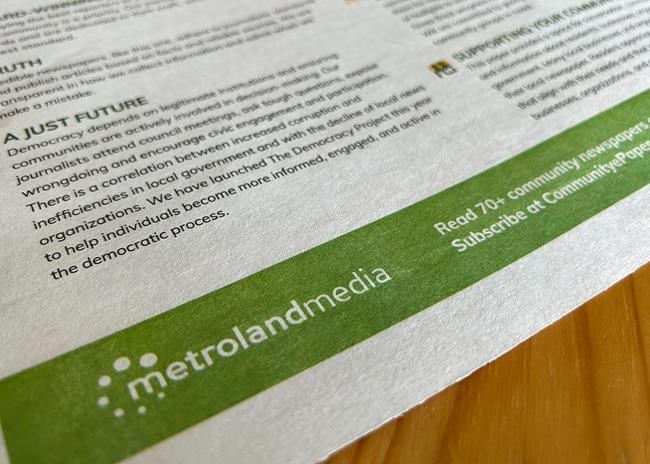TORONTO — Canada's shrinking flyer industry and the slew of businesses who rely on it for advertising were dealt another blow last week when one of Ontario's most prominent media conglomerates stopped printing 70 community newspapers and announced the end of its flyer business.
The papers owned by Metroland Media Group were often stuffed with flyers from large retail chains such as Loblaw Companies Ltd., Walmart Inc. and Metro Inc., along with local businesses showcasing products and services.
Experts say Metroland's departure will push many companies even further toward digital marketing and hasten the decline of Canada's print advertising sector.
"I think some will probably just stop using papers completely," said Claire Tsai, a marketing professor at the University of Toronto's Rotman School of Management.
"Some may still try but overall, at the aggregate level, you will see less use of papers."
The number of newspapers to shut down has accelerated over the last decade as Canadians upped their smartphone usage, encouraging companies to launch digital flyers and apps offering savings or loyalty rewards for users.
While Tsai said some realtors will likely stick with print advertising because of the big photos they can use, others will move away from the medium, especially if it gets pricier.
"When a business exits the industry, there's less competition and so there could be implications on cost and it becomes much more costly to use papers to reach their customers," she said.
Metroland papers were often the lone print journalism publications in the markets they serviced and even those regions with competitors have seen a less vibrant media landscape in recent years.
The federal government has counted some 474 Canadian news businesses that closed between 2008 and 2023.
Over the same time span, marketing dollars moved online.
The federal government has said Google and Meta, which owns Facebook, Instagram and WhatsApp, had a combined 80 per cent share of the $14 billion in online ad revenues seen in the country in 2022.
Meanwhile, the flyer market contracted to 13 billion pieces distributed annually, down from 17 billion pieces about 10 years ago, estimated Joanne McNeish, an associate professor at Toronto Metropolitan University specializing in marketing.
McNeish blames the reduction on the growth of coupon and cost savings apps, retail store apps and websites along with more advertising spending being directed to digital platforms.
"Due to the dominance of search engines and social media, fewer consumers value the editorial function of newspapers, so their readership and associated advertising dollars have declined along with the number of flyers," she wrote in an email.
In some locales, there has even been a war on flyers. The City of Montreal, for example, banned the distribution of bags of print flyers except to people who opt in to receive them, in May, following a similar move from Mirabel, an area north of Montreal.
But paper flyers still have their benefits. They can often make more of an impression because of their visual and tactile nature, which activates more senses and helps with information retention, McNeish said.
Tsai added that when people browse information online, they tend to focus on tangible things like price, but less attention to "soft information" such as brands and visuals.
Online advertising also doesn't reach several demographics, like the elderly or low-income Canadians who are less likely to have phones or computers, Tsai said.
But flyers placed in newspapers are still well read.
A 2020 survey of more than 4,500 Canadians conducted by newspaper publisher Postmedia Network Canada Corp. found 85 per cent of respondents read printed flyers at least some of the time, with more than half of respondents saying they always read printed flyers.
The latest figures McNeish has seen show papers still dominate the unaddressed admail market with large newspapers holding 29 per cent of the market and local newspapers that are packaged with flyers at22 per cent.
McNeish foresees Canada Post and other private distributors, which hold about 20 per cent and 27 per cent of the market, respectively, targeting the six per cent share Metroland papers had.
But some of that advertising is also likely to head online.
"Generally, national large retail companies are better able to pivot to digital media and build apps," she said.
Asked about whether they will continue distributing flyers through another means following the Metroland closures, Loblaw, Walmart and Canadian Tire Corporation Ltd. did not respond. Longo Brothers Fruit Markets Inc. declined to comment.
Metro spokesperson Stephanie Bonk said the company expects flyer distribution to be interrupted for a week following the Metroland decision. Metro is "working with current and new partners on a plan so that customers can expect to receive their Metro and Food Basics flyers via mail delivery the following week," she wrote in an email.
Loblaw has gradually been stepping back from the flyer business. In March 2020 as COVID-19 raged, it pulled in-store flyers over concerns they would help spread the virus.
Later, it permanently ended the publication of paper flyers for several of its chains, including No Frills, Real Canadian Superstore and Maxi, as it worked to shift promotions online and to its app.
Other retailers made similar moves in the years leading up to Metroland's cuts it attributed to "unsustainable financial losses stemming from the changing preferences of consumers and advertisers."
"The decline of the print and flyer distribution business was significantly accelerated by the COVID-19 pandemic, and by the reduction of flyer usage both by readers and advertisers as a marketing vehicle," the company said in a statement.
This report by The Canadian Press was first published Sept. 19, 2023.
Companies in this story: (TSX:L, TSX:CTC.A, TSX:MRU, TSX:PNC)
———
Torstar holds an investment in The Canadian Press as part of a joint agreement with subsidiaries of the Globe and Mail and Montreal's La Presse.
Tara Deschamps, The Canadian Press


